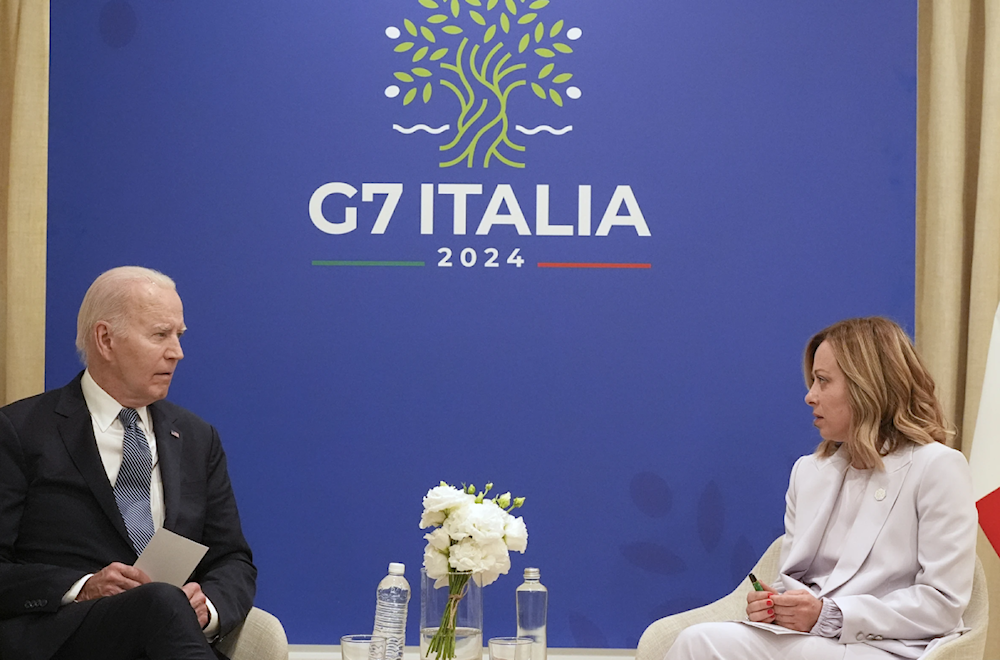G7 statement 'full of arrogance, prejudice, and lies': China
Lin Jian, a spokesperson for China's foreign ministry, argues that the statement "slandered and attacked China."
-

US President Joe Biden and Italian Prime Minister Giorgia Meloni during the G7 summit in Italy on June 14, 2024. (AP)
China lambasted a statement published by the Group of Seven (G7) at the end of their summit in Italy, calling it "full of arrogance, prejudice, and lies."
The group comprises the United States, the United Kingdom, France, Germany, Canada, Italy, and Japan, and the nations' leaders met from June 13-15 with deteriorating economic ties with China and tensions over Ukraine and the South China Sea at the top of their agenda.
Their closing statement alleged that Beijing was delivering "dual-use materials, including weapons components and equipment" to Russia, claiming that this was assisting Moscow in its war with Kiev.
The statement also slammed China's "militarization, coercive, and intimidation activities" in the South China Sea.
In reaction, Lin Jian, a spokesperson for China's Foreign Ministry, argued the statement "slandered and attacked China."
It contained "rehashed cliches that have no factual basis, no legal basis, and no moral justification, and are full of arrogance, prejudice, and lies," he stated during a news conference on Monday.
China has consistently denied aiding Russia with weaponry and has repeatedly blamed the US for fueling the fire that led to the Ukraine war due to NATO's expansion.
At a press conference following a G7 summit in Italy on Saturday, Italian Prime Minister Giorgia Meloni stated that the release of Russian assets frozen in Western jurisdictions will be contingent upon the commencement of a peace process in Ukraine.
She further mentioned that the forthcoming discussions would address financial contributions toward Ukraine's reconstruction efforts.
"It is clear that since the assets were frozen due to sanctions and since the sanctions are actually related to aggression against Ukraine, the possibility of unfreezing will only be possible in the event of a peace process. But I assume that this peace process will also discuss the issue of who should pay for Ukraine's reconstruction," Meloni said.
The backing of Ukraine by G7 nations is essential for achieving any diplomatic resolution to the Ukraine conflict, Meloni noted, adding that the G7's commitment to allocating $50 billion in loans to Ukraine by year-end, sourced from earnings on Russia's frozen assets, demonstrates their ongoing support for Kiev.
Following the summit, the G7 asserted in a statement that Russia must bear responsibility for the damages inflicted on Ukraine, which have surpassed $486 billion. On Wednesday, they agreed to provide Ukraine with $50 billion by utilizing frozen Russian assets by the end of the year.
Bloomberg reported in May that the European Union agreed on a plan to utilize the income from blocked Russian sovereign assets to boost Ukraine's rehabilitation and military spending.
Iran too dismisses G7 statement on nuclear program
In a statement issued on Sunday, the Iranian Foreign Ministry dismissed allegations from the Group of Seven (G7) regarding Iran's nuclear program, with the Ministry's spokesperson Nasser Kanaani firmly rejecting the G7's claims, which cast doubt on the peaceful nature of Iran's nuclear activities.
The G7 had issued a warning to Iran on Friday, cautioning against advancements in its nuclear enrichment program and suggesting potential new measures if Tehran were to transfer ballistic missiles to Russia.
Kanaani criticized the G7's reference to a recent anti-Iran resolution by the International Atomic Energy Agency's (IAEA) Board of Governors, calling it a politically motivated move. He argued that certain governments were abusing international mechanisms to target sovereign states like Iran.
"Iran will continue its constructive interaction and technical cooperation with the IAEA within the framework of its duties and rights," Kanaani stated, emphasizing that Tehran remains committed to its peaceful nuclear projects in line with the Non-Proliferation Treaty (NPT) and the Safeguards Agreement, despite political pressures.
He attributed the current tensions to "illegal measures" by the United States and the UK, France, and Germany, asserting that these countries need to demonstrate goodwill and avoid politically driven actions to address all parties' concerns.

 4 Min Read
4 Min Read








